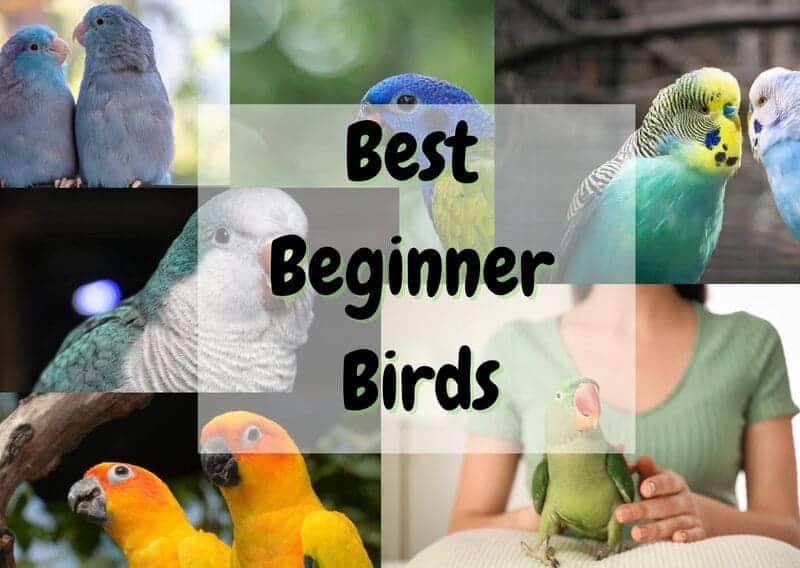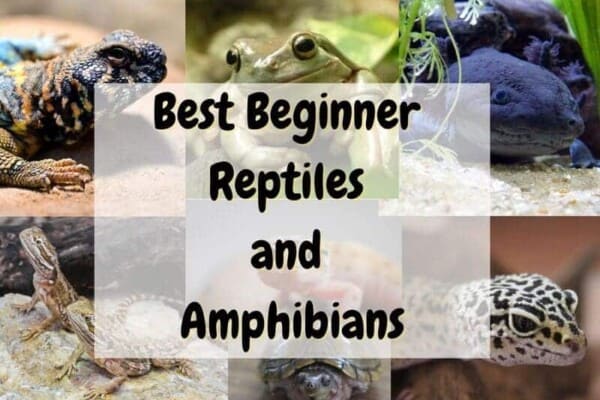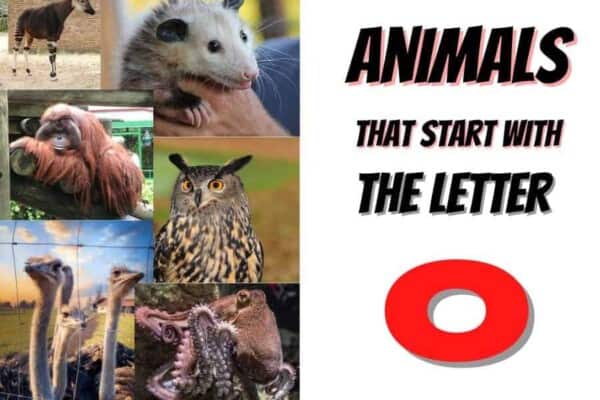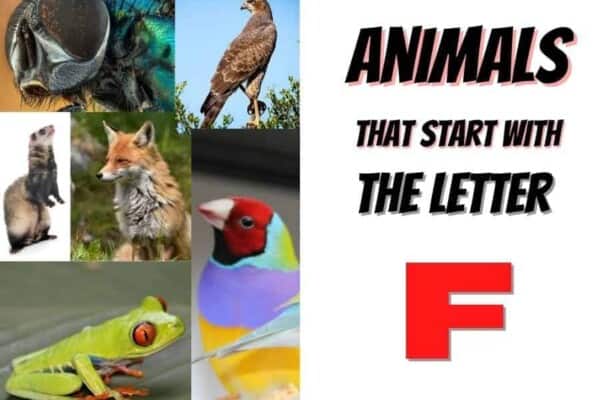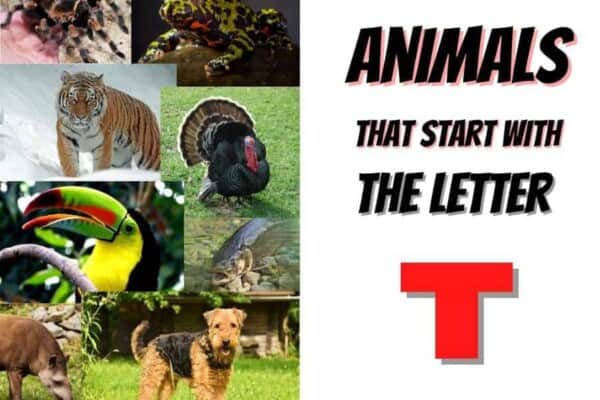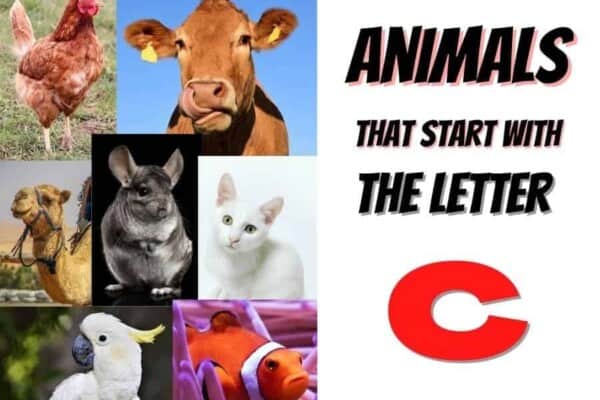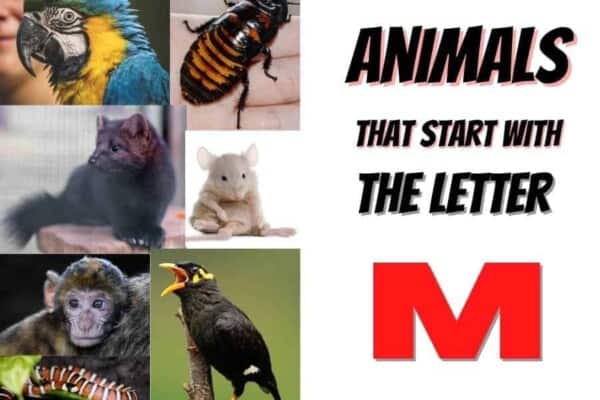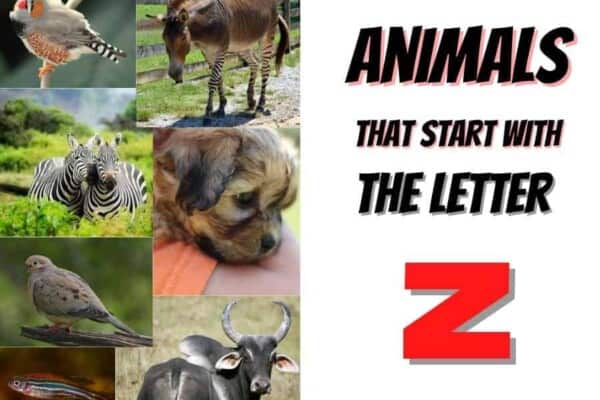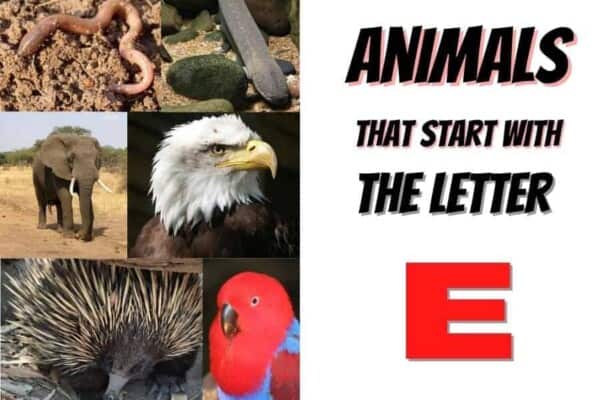Birds are generally considered to be one of the more complicated animals to own, but that does not mean they all are. If you are interested in a pet bird, there are some really great options for beginners.
In this article, we are going to go over 12 of the best birds for beginners, along with some important things that you need to consider before bringing your new pet home.
12 Best Beginner Birds – A Complete Guide
| Bird Name | Scientific Name | Lifespan | Size | Price |
|---|---|---|---|---|
| 1. Budgies | Melopsittacus undulatus | 5-8 years | 7″ | $10-35 USD |
| 2. Cockatiels | Nymphicus hollandicus | 10-14 years | 12″-14″ | $80-$150 USD |
| 3. Canaries | Serinus canaria | 10 years | 4″-5″ | $25-$150 USD |
| 4. African Grey Parrot | Psittacus erithacus | 40-60 years | 13″ | $1500-$3500 USD |
| 5. Finches | Fringillidae | 10-20 years | 3″-8″ | $20-$100 USD |
| 6. Lovebirds | Agapornis | 10-15 years | 5″-7″ | $100-$150 USD |
| 7. Parrotlets | Forpus coelestis | 15-20 years | 4″-5″ | $100-$350 USD |
| 8. Conures | Pyrrhura molinae | 20-30 years | 12″ | $150-$350 USD |
| 9. Quaker Parakeets | Myiopsitta monachus | 20-30 years | 11″ | $600-$700 USD |
| 10. Pionus Parrots | Pionus menstruus | 25 years | 10″-11″ | $900-$1700 USD |
| 11. Amazon Parrots | Amazona farinosa | 50 years | 11″-13″ | $1000-$3000 USD |
| 12. Doves | Columba livia | 12-15 years | 7.5″-12″ | $20-$100 USD |
1. Budgies
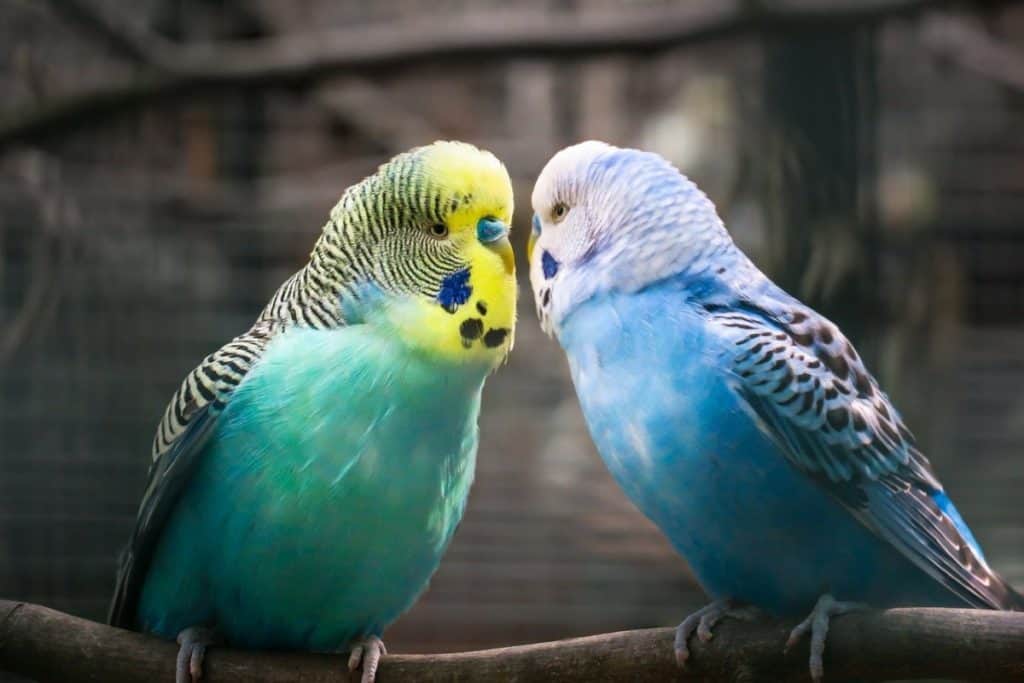
Budgies make great beginner pets. They are very friendly animals and are even known to be affectionate after you care for them long enough for a bond to develop. They are a small, cute breed of birds, and they are also extremely intelligent. Some people are even able to teach their budgies tricks in addition to the fact that they can learn how to talk. Because of all of these different facets of their personalities and the fact that they are relatively simple to care for, budgies make great beginner pets.
- Lifespan: 5 – 8 years
- Size: 7 inches
- Price: $10 – $35
2. Cockatiels
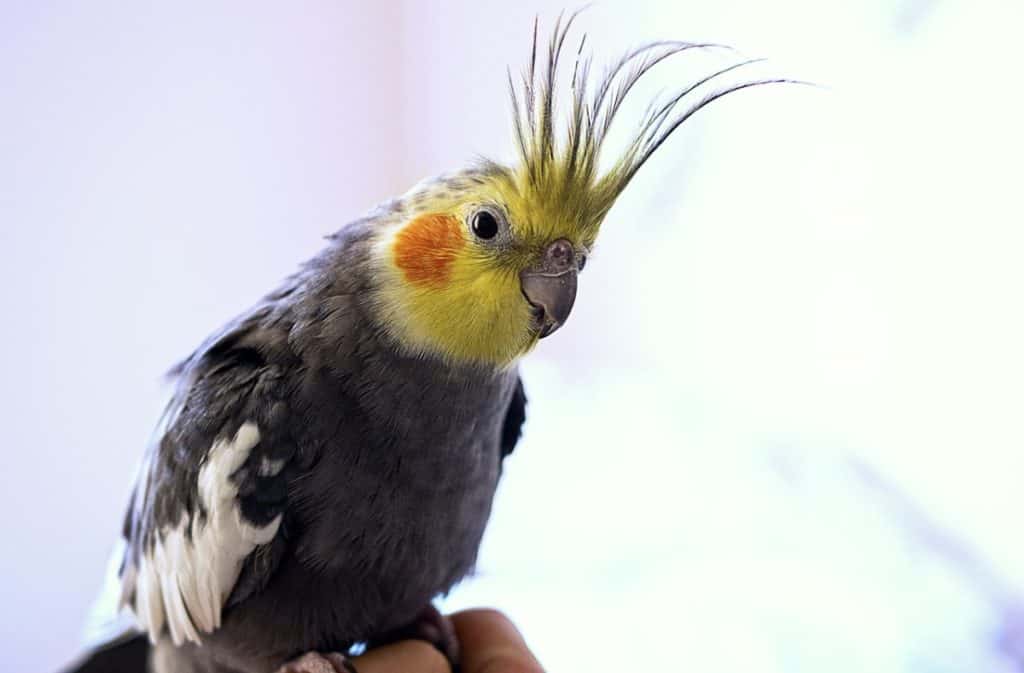
Cockatiels are extremely popular pets amongst both beginner and experienced bird owners. Cockatiels, especially female cockatiels, make great first pets because they tend to be fairly gentle and affectionate. Males are a bit more difficult and can be known to get moody or nip if they do not get enough attention, but both are relatively easy to care for. Cockatiels do require large cages with several places to perch and toys to play with. Additionally, you will need to have the time in your schedule to allow them a couple of hours out of the cage each day.
- Lifespan: 10 -14 years
- Size: 12 – 14 inches
- Price: $80 – $150
3. Canaries
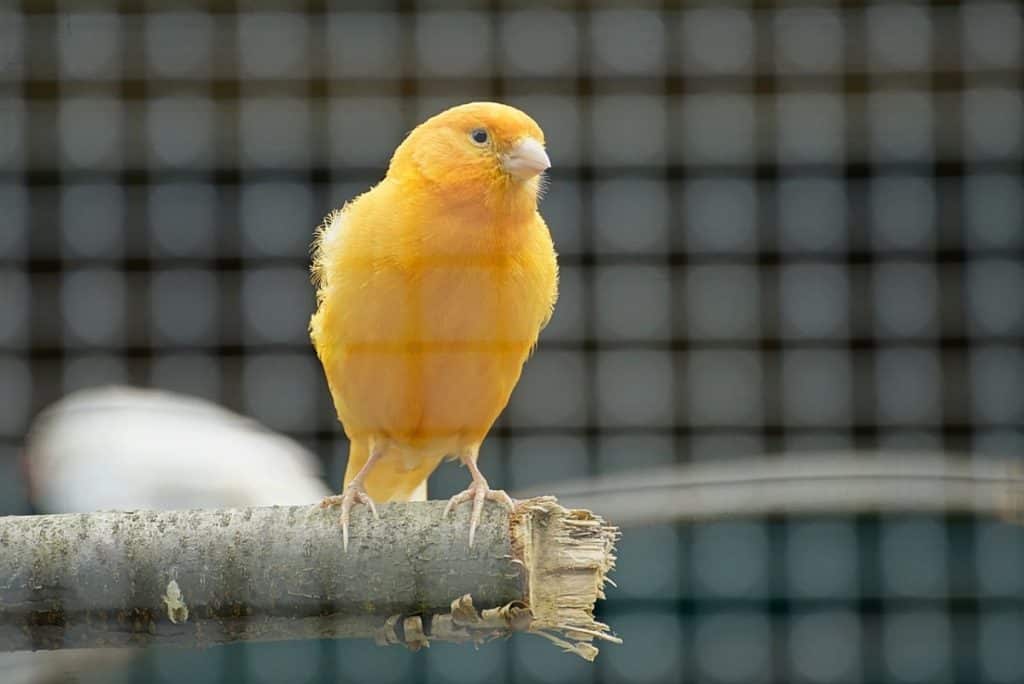
Canaries are beautiful, vibrant little birds. You can get them in a variety of different colors, including yellow, green, and bright orange. One reason that people love canaries is that both the males and the females sing, but they do not talk, which is good for beginners who are not ready to have a conversation with their pets yet. They are also perfect if you are not interested in a bird that you have to handle a lot because they are most happy when they can just hang out in their cage and sing.
- Lifespan: 10 years
- Size: 4 – 5 inches
- Price: $25 – $150
4. African Grey Parrot
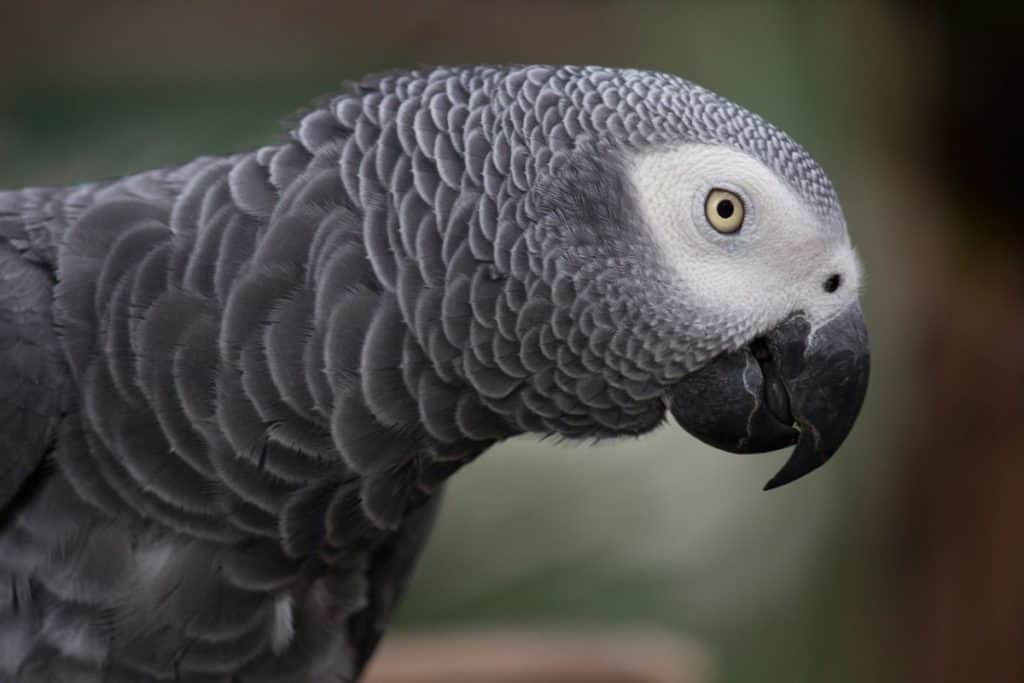
If you are looking for a larger bird as your beginner pet, consider the African Grey Parrot. They are large and live long, healthy lives as long as they are taken care of properly. They are also extremely chatty. They are also great companion birds as they are very intelligent and can be very affectionate. They are a bit harder than some of the other species on this list because they are so much larger, but if a larger bird is what you are looking for, they make a great option.
- Lifespan: 40 – 60 years
- Size: 13 inches
- Price: $1500 – $3500
5. Finches
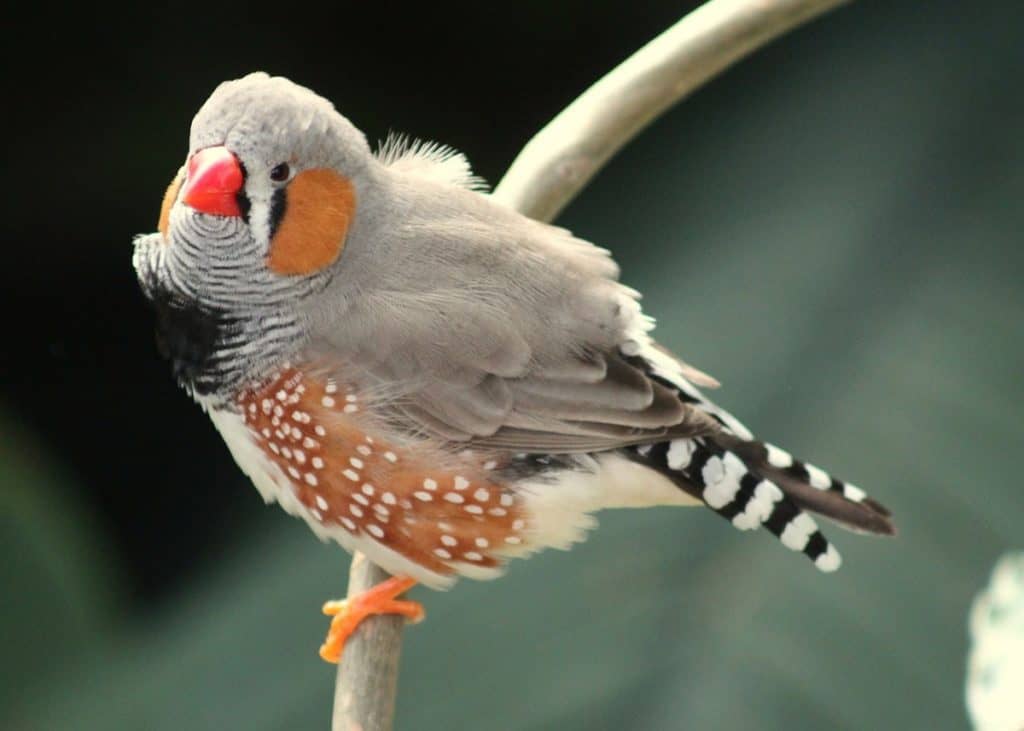
Another option if you are looking for an easy pet bird that you do not have to spend a lot of time caring for is a finch. Finches are fast and energetic, so they will need lots of space to fly around, but they are perfectly content in their cage. You should buy them in pairs or small groups as they like to be social with each other, but they will need enough space or else they may start to get into fights. Because they do not need to be handled very often, they also make a good pet for children as long as you lock the cage to ensure the child won’t disturb them too often.
- Lifespan: 10 – 20 years
- Size: 3 inches – 8 inches
- Price: $20 – $100
6. Lovebirds
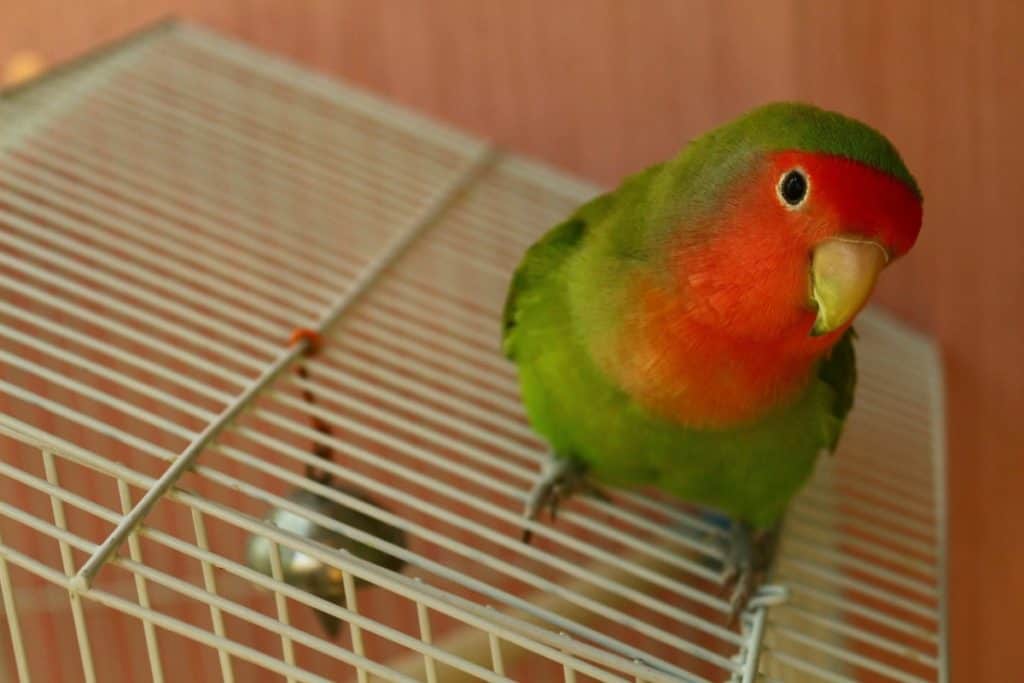
Lovebirds are a lot of fun and still relatively easy to care for, though they can be a little bit more difficult to handle than some of the other birds on this list. One reason lovebirds are a great option for beginner pet owners is that they can be perfectly happy living alone. Sometimes one bird can be a lot less intimidating for new pet owners than having to get multiple birds at one time. They are also very playful, which makes them a lot of fun to watch, and they will also love learning new tricks.
- Lifespan: 10 – 15 years
- Size: 5 – 7 inches
- Price: $100 – $150
7. Parrotlets
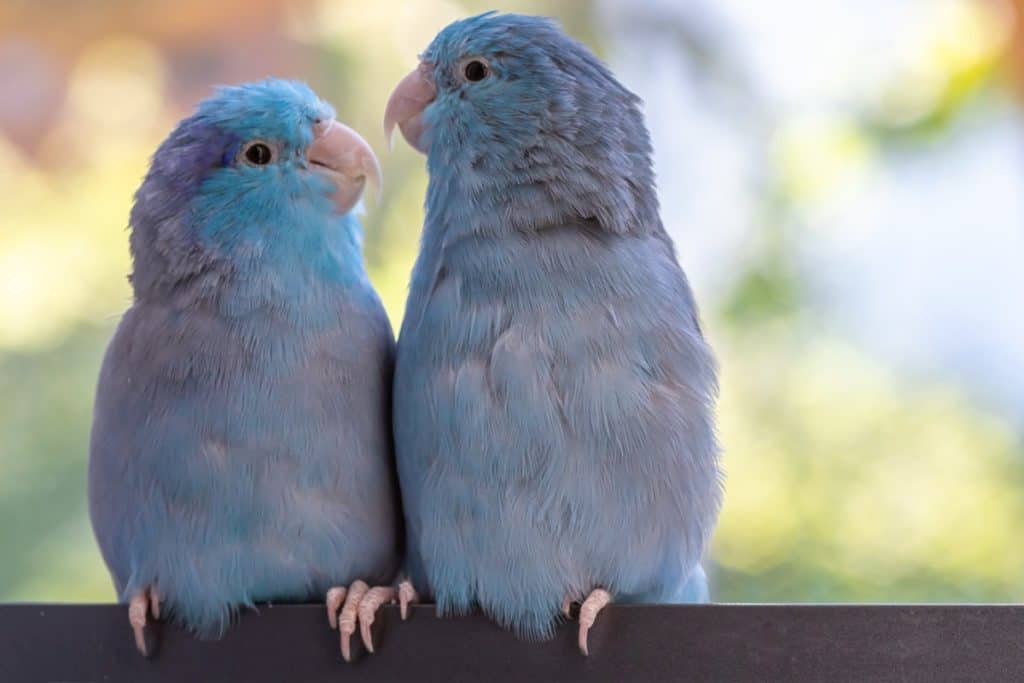
Parrotlets are the smallest breed of parrot available, and they are often considered to be the ideal pet. They are small, absolutely adorable, and really easy to care for. Additionally, they tend to have an abundance of personality which makes them very entertaining and fun. You will need to have a good bit of time to tame this pet as they require pretty regular attention, but this means that they make great companion animals if that is what you are looking for.
- Lifespan: 15 – 20 years
- Size: 4 – 5 inches long
- Price: $100 – $350
8. Conures
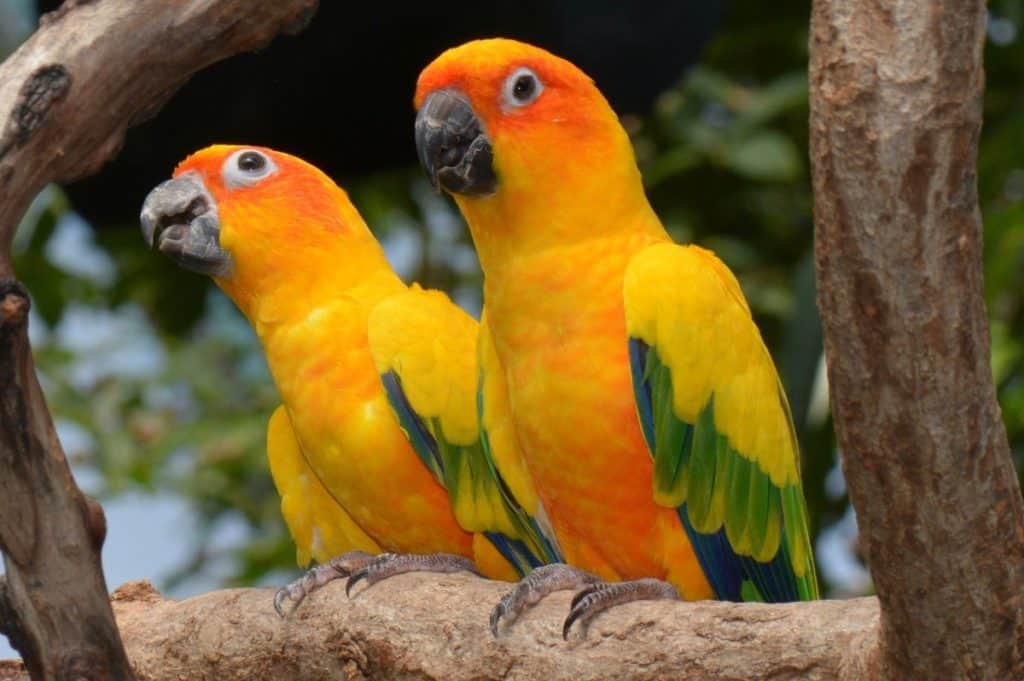
Conures are little affectionate birds, and because they are so easy to handle, they make great beginner pets. However, they do need lots of attention and will not be happy just hanging out by themselves in the cage all day long, every day. As long as you have space and time to care for them, they are a lot less moody and difficult than many other species of birds.
- Lifespan: 20 – 30 years
- Size: 12 inches
- Price: $150 – $350
9. Quaker Parakeets
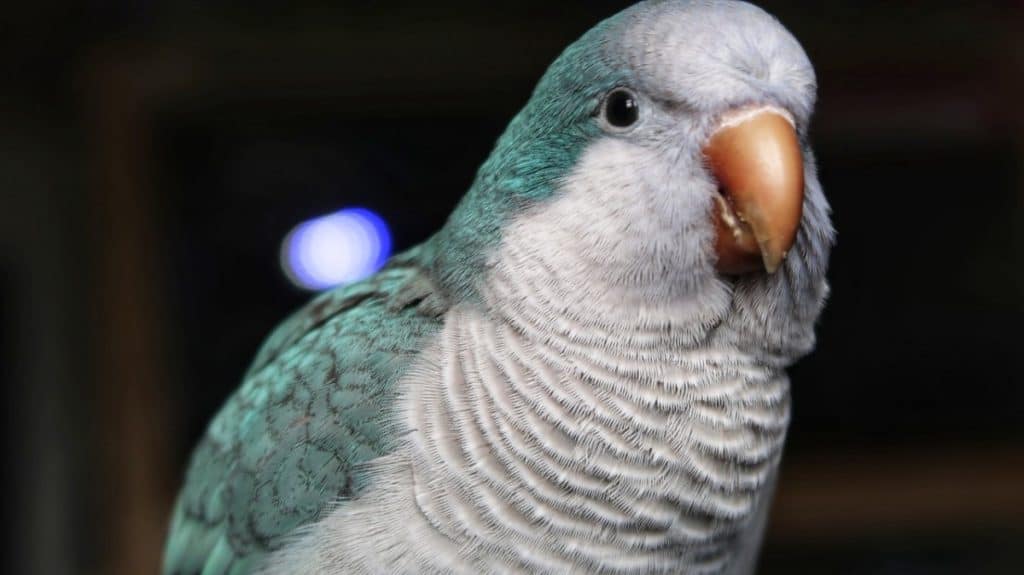
Quaker parakeets (also known as Monk Parakeets) are very vocal little birds which can make them a lot of fun for new owners. Some talk while others prefer just to whistle, but they are also very affectionate once they warm up to you. Quaker parakeets are illegal in some areas due to being a threat to native agriculture, so make sure you look up your local laws before bringing your new parakeet home. But as long as they are legal where you are, quaker parakeets are a great first pet bird.
- Lifespan: 20 – 30 years
- Size: 11 inches
- Price: $600 – $700
10. Pionus Parrots
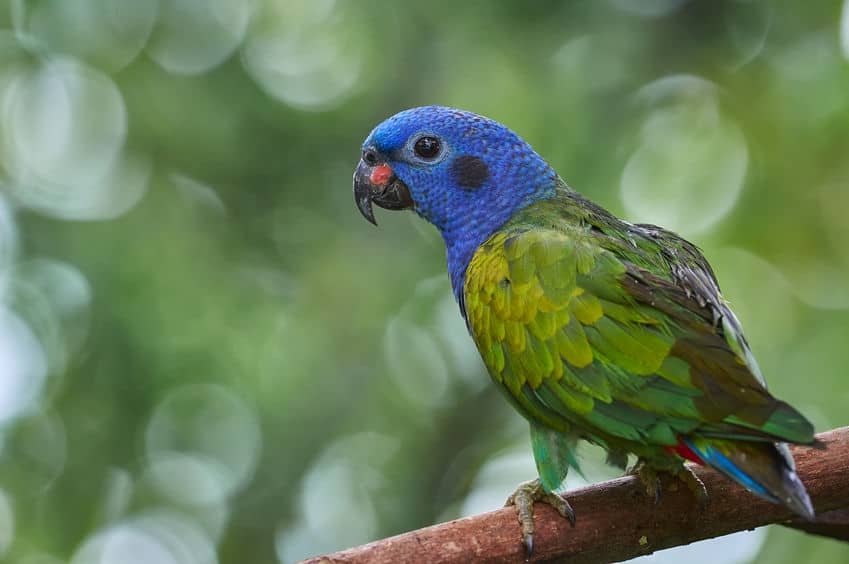
Pionus parrots are not nearly as popular as some other breeds of parrots, but they are great beginner birds. They are small and therefore easy to care for and handle. They are also relatively quiet when compared to many other bird species and breeds, which makes them great if you are not sure if you would like constant chirping, singing, or talking. Overall, Pionus Parrots are one of the sweetest and most easy-going birds on this list.
- Lifespan: 25 years
- Size: 10 – 11 inches
- Price: $900 – $1700
11. Amazon Parrots
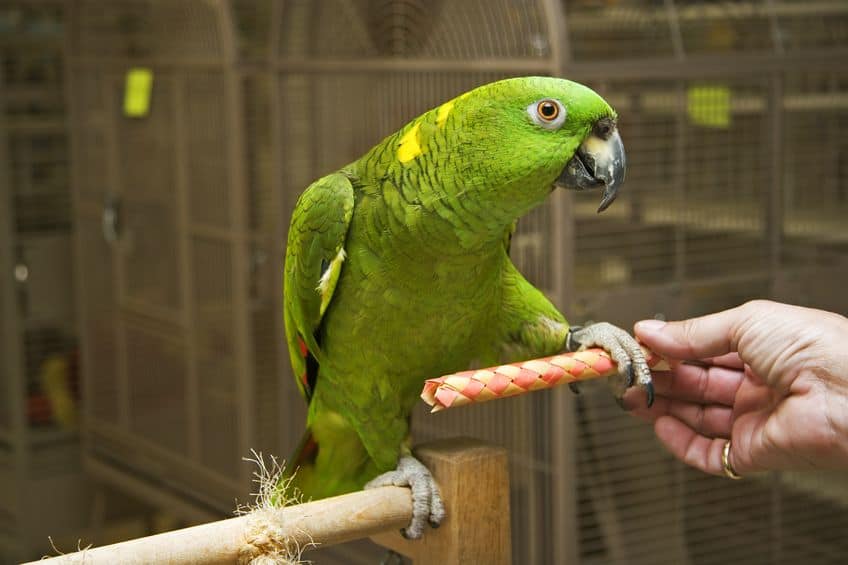
Amazon Parrots are more expensive than most other beginner birds, which is why some people do not consider them beginner birds at all. However, if you are interested in a talking bird and if you are ready to learn the ropes of caring for an interesting bird, the Amazon Parrot may be the perfect option for you. They are super fun and absolutely love attention. The one thing to keep in mind is that these birds are extremely smart, which can make them little tricksters. Make sure you give them plenty of time to socialize and play with toys.
- Lifespan: 50 years
- Size: 11 – 13 inches
- Price: $1000 – $3000
12. Doves
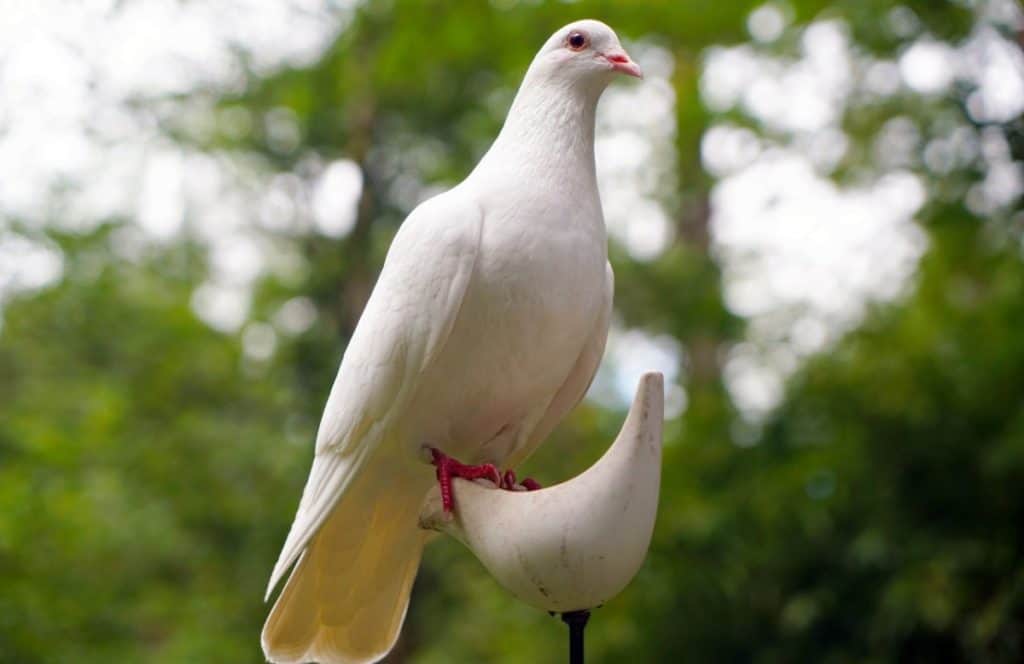
I am sure you have heard of doves before, but you may not have known that they make such great beginner birds. They are medium-sized birds, which makes cleaning up pretty easy. Furthermore, as long as they are fed a healthy diet, have access to sunlight or UV light, and are given a few hours out of the cage each day, they will be perfectly happy. They are also known for being gentle and good at entertaining themselves for most of the day.
- Lifespan: 12-15 years
- Size: 7.5 – 12 inches
- Price: $20 – $100
Things to Consider Before Bringing Home Your First Pet Bird
- Need for socialization: Some birds are perfectly happy living on their own, while others need at least one other bird to socialize with in order to be happy. This might affect the cost and the amount of space that you will need to have for your birds.
- Noise: Birds tend to make a good bit of noise, especially big ones. So if you live in a small space or are going to be keeping the bird in your bedroom, you want to keep this in mind. If you like silence, a noisy bird might not be the best pet for you.
- Commitment: You need to decide upfront how many years you want to commit to your bird. Some birds live really short lives, which is great for some people but will make others really sad. However, other birds may be around for the rest of your life, so you need to be prepared to make that lifetime commitment.
- Feeding Habits: The bigger the bird, the more it will typically need to eat, and it may also need a variety of different foods. You need to ensure that you have and can afford the different foods that your bird will need for a happy and healthy life before making a purchase.
- Space: Some birds are happy in smaller cages with room to climb, while other birds need lots of space to fly around. Make sure you consider this before making a purchase so you can clear out an area in your house large enough to house their cage.
- Grooming: Most birds are self-grooming, so this is not too big of a concern, but some birds are more complicated to own and care for. You will need to make sure they have what they need to self-groom, such as accessories to rub against.
Related articles:
Resources and further reading:
- Parrots, Julie Murray
- Parrots of the World, Joseph M. Forshaw
- Exotic Pet Behavior — Birds, Reptiles, and Small Mammals, Bradley Bays T, Lightfoot T, Mayer J. Saunders Elsevier

